Diplomatic Bluebook 2018
Chapter 2
Japan's Foreign Policy that Takes a Panoramic Perspective of the World Map
3 Southeast Asia
(1)Indonesia
The Joko administration inaugurated in October 2014 has so far increased its support from the people by implementing three cabinet reshuffles, reforms of the social welfare system, reforms of the education system, development of infrastructure, and other economic policies, and the administration is gaining further stability. On the other hand, as it could be seen in the runoff Jakarta gubernatorial election held in April 2017, the political forces have been stepping up their activities in preparation for the upcoming presidential and general elections in 2019, signaling the start of the season for politics in Indonesia.
In relations with Japan, meetings between the leaders and ministers were also held in 2017, and in preparation for the 60th anniversary of the establishment of Japan-Indonesia diplomatic relations in 2018, there were exchanges of opinions to further bolster cooperative ties between the two countries. In January 2017, Prime Minister Abe visited Indonesia to hold a Summit Meeting with President Joko at Bogor Palace, and issued a Japan-Indonesia Joint Statement on Strengthening Strategic Partnership. At the ASEAN-related Foreign Ministers' Meeting (Manila, the Philippines) in August, Foreign Minister Kono held a meeting with Foreign Minister Retno to exchange opinions on the enhancement of bilateral relations and regional affairs including the South China Sea and North Korea. They agreed to continue working in close cooperation. Furthermore, Minister of Marine Affairs and Fisheries Susi paid Foreign Minister Kono a courtesy visit, and expressed her wish to cooperate with Japan, with advanced technology, to manage fisheries resources and to deal with illegal fishing boats. At the ASEAN-related Summit Meeting (Manila, the Philippines) in November, another Summit Meeting was held, and both leaders agreed to further strengthen bilateral ties, including the current infrastructure cooperation, in preparation for 2018, the upcoming 60th anniversary of the establishment of diplomatic relations between the two countries. In December, on the occasion of the visit of Coordinating Minister for Maritime Affairs Luhut, State Minister for Foreign Affairs Kazuyuki Nakane held the 1st Japan-Indonesia Maritime Forum with Minister Luhut and maritime ties between the two countries have deepened further.
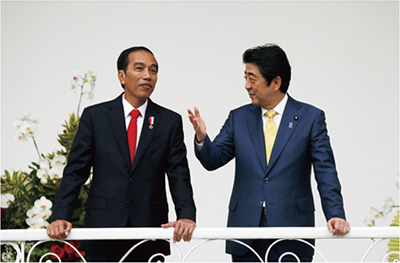 Summit Meeting held with President Joko when Prime Minister Abe visited Indonesia (January 15, Bogor, Indonesia; Photo: Cabinet Public Relations Office)
Summit Meeting held with President Joko when Prime Minister Abe visited Indonesia (January 15, Bogor, Indonesia; Photo: Cabinet Public Relations Office)(2) Cambodia
Cambodia is located in a strategic point of the Southern Economic Corridor and serves as a key country in strengthening connectivity in the Mekong region and narrowing the regional development gap in the ASEAN region. The country has been promoting a development policy with emphasis on the enhancement of governance, with the aim of entering the group of Upper Middle-Income Countries by 2030.
Japan has been cooperating actively with Cambodia, including through the Cambodian peace process in the late 1980s and in its subsequent reconstruction and development process. In 2013 the relations between the two countries were elevated to a “Strategic Partnership.” On the occasion of the Official Working Visit by Prime Minister Hun Sen in August 2017 a Summit Meeting with Prime Minister Abe was held. Prime Minister Abe stated that Japan will enhance assistance in areas including improvement of logistics, industrial human resource development and reinforcement of urban functions, with a view of assisting Cambodia in becoming a upper middle income country by 2030. In response, Prime Minister Hun Sen expressed his gratitude for Japan's assistance, and expressed his support for Japan's policies: “Proactive Contribution to Peace” and “Free and Open Indo-Pacific Strategy.” Other than that, State Minister for Foreign Affairs Nobuo Kishi and Parliamentary Vice-Minister for Foreign Affairs Iwao Horii visited Cambodia in May and October respectively.
In recent years, an expansion of the bilateral relationship has been seen in a variety of areas such as an increase in the number of Japanese residents and Japanese companies in Cambodia, and vitalized exchanges between local governments. The Consular Office of Japan in Siem Reap was opened in January 2018, the 65th anniversary year of the establishment of the diplomatic relations.
Regarding domestic affairs, political discord between the ruling and opposition parties has increased since the opposition party, the Cambodian National Rescue Party(CNRP), became much stronger in the National Assembly (lower house) election in 2013. Then in November 2017, CNRP was dissolved due to a violation of the law on Political Parties. The future issue is how the will of the people of Cambodia can be reflected in the general elections to be held in July 2018.
In the Khmer Rouge Tribunal which Japan has been supporting for many years, two former leaders of the Khmer Rouge regime, including a former head of state, were given sentences of life imprisonment by the Supreme Court Chamber in November 2016. Subsequently, the hearings for the other cases against them were conducted in the Trial Chamber.
(3) Singapore
For many years, bilateral ties between Japan and Singapore have been extremely good, and there have been active exchanges of senior officials.
In Singapore the People's Action Party (PAP), led by Prime Minister Lee Hsien Loong, occupies an overwhelming majority of seats in the Parliament. In the 2015 general elections, the ruling party succeeded in overturning the downward trend in support for the ruling party. Singapore has been proactive in the appointment of young cabinet members many of whom are in their 40s, known as “the fourth generation,” making steady progress toward a change of generations.
In relations with Japan, there were continued high-level exchanges in 2017. During his visit to Germany to attend the G20 Summit in July, Prime Minister Abe held a meeting with Prime Minister Lee Hsien Loong. Based on the variety of achievements by Japan and Singapore, as the two countries commemorated their 50th anniversary of the establishment of diplomatic relations in 2016, the leaders agreed to further deepen bilateral ties. Furthermore, in the meeting between Foreign Minister Balakrishnan and Special Adviser to the Prime Minister Kentaro Sonoura, in December, they confirmed the importance of ensuring rule of law and freedom of navigation, enhancing connectivity, promoting free trade, regional economic integration, etc., as Singapore is set to be the ASEAN Chair in 2018.
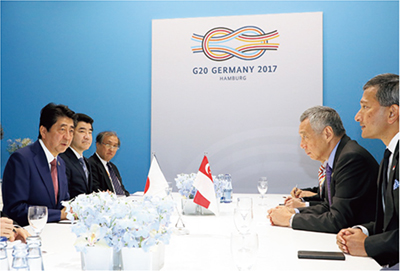 Japan-Singapore Summit Meeting (July 8, Germany; Photo: Cabinet Public Relations Office)
Japan-Singapore Summit Meeting (July 8, Germany; Photo: Cabinet Public Relations Office)On the economic front, many Japanese companies have established regional headquarters in Singapore, and cooperation between companies from the two countries continues to progress in areas such as infrastructure. The Japan-Singapore Economic Partnership Agreement (JSEPA), signed and enacted in 2002, was the first bilateral EPA signed by Japan.
Furthermore, the two countries work together to carry out technical cooperation through the “Japan-Singapore Partnership Program for the 21st Century (JSPP21),” targeting developing countries. The two countries also enjoy active intellectual and cultural exchanges through establishment of the Japan Creative Center, a base for disseminating information on Japan's culture.
(4) Thailand
Thailand is located in the center of the Mekong region and has a “Strategic Partnership” relationship with Japan. A lot of production bases of Japanese companies are in Thailand as a consequence of investment accumulated over the years. Nowadays, they serve as an essential part of global supply chains for the Japanese economy. Under the parliament and interim cabinet established by the military government, a process to restore democracy had been under way, and a new constitution was promulgated and put into effect in April 2017. The restoration of democracy is expected to be achieved through the implementation of parliamentary elections around February 2019.
As a consequence of the demise in October 2016 of His Majesty King Bhumibol, the country went into mourning until October 2017. A royal cremation ceremony for His Majesty the late King Bhumibol was held in October.
Various levels of exchanges, including political and economic ones, have been continued between Japan and Thailand on the foundation of the close relationship between the imperial and royal families. In particular, this year marked the 130th anniversary of the establishment of diplomatic relations between Japan and Thailand, and extensive exchanges and celebratory events were held in both the public and private sectors, reconfirming close and friendly ties between the two countries, and the importance of further promoting them. In September, Foreign Minister Don and Parliamentary Vice-Minister for Foreign Affairs Iwao Horii visited each other's countries to attend commemorative events and exchange celebratory commemorative messages between the leaders and foreign ministers.
Three Japan-Thailand Foreign Ministers' Meetings were held in 2017. Other than that, there were continued high-level exchanges in 2017. Deputy Prime Minister Somkid visited Japan in June, and along with Chief Cabinet Secretary Yoshide Suga co-chaired the Third Meeting of the Japan-Thailand High Level Joint Commission attended by the cabinet ministers concerned and seven memorandums on cooperation were signed.
(5) Timor-Leste
Timor-Leste, the first country which achieved independence this century, has realized peace and stability with the support of the international community and has been building the nation based on democracy. In the Timor-Leste presidential election held in March 2017, Mr. Lu Olo, the leader of the opposition party, Fretilin, ran for president for the third time. He was elected in the first ballot, becoming the fourth president of the country in May. Prime Minister Abe sent him a congratulatory letter, and expressed his intention to continue providing total support to the development of Timor-Leste. The inauguration ceremony held on the same day was attended by Special Envoy of Prime Minister Gen Nakatani. Furthermore, a parliamentary election was held in July to elect members of the National Parliament. Japan dispatched a group of observers to oversee the election. In September, Mr. Alkatiri was elected as the new Prime Minister, marking the inauguration of the 7th Constitutional Government.
In July 2011, a “Strategic Development Plan (SDP)” (long- term guidelines for development policy up until 2030) was formulated in Timor-Leste, and the country is currently proceeding from the stage of post-conflict reconstruction to the new stage of full-scale development. Japan will continue to fully boost the efforts of Timor-Leste as it proceeds to this new stage, while continuously maintaining close cooperation in the international arena. In May, the two countries exchanged the documents regarding the “Economic and Social Development Programme,” a grant aid of up to 200 million yen through providing medical equipment with the aim of improving healthcare services. Furthermore, Japan has been supporting Timor-Leste's aim of acceding to ASEAN smoothly and assisting in human resources development toward the accession.
(6) The Philippines
In the Philippines, the Duterte administration, in the second year since its inauguration, ran the country with stability backed by a high approval rating. On the other hand, an armed conflict broke out with an Islamic extremist group in Marawi City on the island of Mindanao, and President Duterte placed the entire island under martial law. The conflict came to an end in October, but the challenges remained are to ensure security and order, implement counter-terrorism measures, and revitalize the city. Regarding the economy, the Philippines maintained strong economic growth, while actively promoting policies in accordance with a socio-economic development agenda, including infrastructure development and tax system reform. Furthermore, as the ASEAN Chair in 2017, the Philippines held summit meetings, foreign ministers' meetings and other related meetings.
Japan and the Philippines witnessed frequent exchanges as “Strategic Partners” in 2017. In January, Prime Minister Abe became the first overseas leader to visit Davao, President Duterte's hometown, and pledged to provide the support of 1 trillion yen over five years. Secretary of Foreign Affairs Cayetano visited Japan in June to hold a Japan-Philippines Foreign Ministers' Meeting. Furthermore, in October, President Duterte visited Japan for the second time as President. A joint statement on bilateral cooperation for the next five years was issued. Japan and the Philippines agreed to further enhance cooperation in a variety of fields including the infrastructure development such as the subway projects in Metro Manila, providing assistance in Mindanao, and combatting illegal drugs. Japan-Philippines Foreign Ministers' Meeting was also held on the same occasion. Furthermore, Foreign Minister Kono visited the Philippines in August for the ASEAN-related Foreign Ministers' Meetings, and Prime Minister Abe visited the Philippines in November to attend the ASEAN-related Summit Meetings.
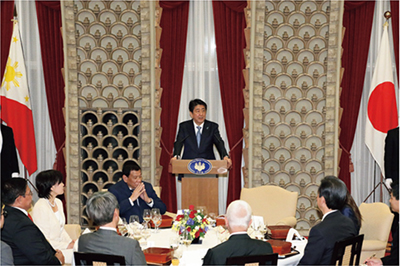 Prime Minister Abe greets President Duterte at the banquet hosted by the Prime Minister (October 30, Tokyo; Photo: Cabinet Public Relations Office)
Prime Minister Abe greets President Duterte at the banquet hosted by the Prime Minister (October 30, Tokyo; Photo: Cabinet Public Relations Office)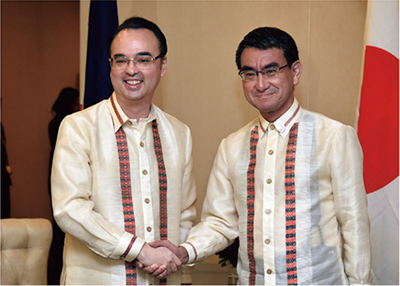 Japan-Philippines Foreign Ministers' Meeting (August 6, Manila, the Philippines)
Japan-Philippines Foreign Ministers' Meeting (August 6, Manila, the Philippines)(7) Brunei
Brunei achieved high economic levels, thanks to rich natural resources. However, the economic growth rate has fallen in the past few years, caused by falling prices of crude oil and natural gas, so the Government of Brunei is aiming for economic diversification to avoid overreliance on energy resources.
Japan and Brunei have maintained friendly relations over a long period of time. Around 60% of Brunei's liquefied natural gas (LNG) exports are bound for Japan, and LNG from Brunei makes up around 5% of the total LNG import to Japan, making Brunei an important country for the stable supply of energy resources to Japan. Through “JENESYS 2.0,” launched in 2013, Japan and Brunei witness frequent exchanges of young people who carry the future of Japan-Brunei relations on their shoulders. Sports exchanges, represented by badminton, are extremely important in promoting bilateral ties. Judo and karate are also steadily becoming popular in Brunei.
In 2017, various ministers, including Minister at Prime Minister's Office and Second Minister of Foreign Affairs and Trade Lim Jock Seng and Minister of Energy and Industry of Prime Minister's Office Yasmin visited Japan. During the ASEAN-related Foreign Ministers' Meeting held in August in Manila, the Philippines, Foreign Minister Kono met with Minister Lim Jock Seng, which led to a Japan-Brunei Foreign Ministers' Meeting in November in Da Nang, Viet Nam. Furthermore, during the ASEAN-related Summit Meeting held in November in Manila, the Philippines, a Japan-Brunei Summit Meeting was held, and Prime Minister Abe congratulated Sultan Bolkiah on the 50th anniversary of the accession to the throne in 2017, and exchanged opinions on further bolstering bilateral ties through supporting Brunei's efforts toward economic diversification. Permanent Secretary of the Ministry of Foreign Affairs and Trade Lim Jock Hoi, who will be assigned as the next ASEAN Secretary-General from January 2018, visited Japan in December to hold a meeting with Foreign Minister Kono, who expressed his support for promoting cooperation with Brunei in the integration of ASEAN. Brunei has been serving as the ASEAN Country Coordinator for Japan for three years since 2015.
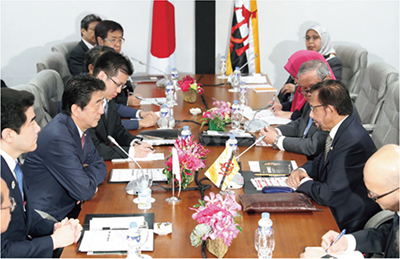 Japan-Brunei Summit Meeting (November 13, Manila, the Philippines (representative photo); Photo: Cabinet Public Relations Office)
Japan-Brunei Summit Meeting (November 13, Manila, the Philippines (representative photo); Photo: Cabinet Public Relations Office)(8) Viet Nam
Located next to sea lanes in the South China Sea and sharing a long border with China, Viet Nam is a geopolitically important country. Given that the country embraces the third largest population in Southeast Asia, and is experiencing a surge in the number of people in middle-income brackets, Viet Nam is becoming a promising market. After the inauguration of the new leaders of the Communist Party of Viet Nam in January 2016, the country has been striving to realize stable economic growth through the stabilization of the macro-economy including control of inflation, the promotion of foreign investment by the development of infrastructure and the improvement of the investment environment. Moreover, the Government has been engaging actively in anti-corruption measures and administrative reform.
In 2017, Viet Nam acted as APEC Chair, and at the APEC Summit and Ministerial meeting held in Da Nang in November achieved major diplomatic results, including the agreement in principle to TPP11. Furthermore, Viet Nam welcomed President Trump of the U.S. followed by President Xi Jinping of China as State Guests after the meeting, demonstrating a well-balanced diplomatic policy.
There have been active mutual high level exchanges, including the visit to Viet Nam by Prime Minister Abe in January, and the Speaker of the House of Representatives, Oshima in May, the visit to Japan by Deputy Prime Minister and Minister of Foreign Affairs Minh, the visit to Japan by Prime Minister Phuc and his spouse as an Official Visit in June, and the attendance of Prime Minister Abe and Foreign Minister Kono at the APEC Viet Nam Summit and Ministerial Meeting in Da Nang in November. 2018 marks the 45th anniversary of the establishment of Japan-Viet Nam diplomatic relations, and a variety of cultural exchange programs are planned in both countries to further deepen the “Extensive Strategic Partnership” between them.
Their Majesties the Emperor and Empress visited Viet Nam for a period of six days from February 28, 2017. The visit was realized with a long-held invitation from Viet Nam. In addition, on their way home from Viet Nam, Their Majesties paid a condolence visit to Thailand in order to show their respect for His Majesty King Bhumibol Adulyadej, who passed away on October 13, 2016.
Viet Nam is a country located east of the Indochina peninsula with a population of around 93.7 million people. Although it has no royal family, it is a pro-Japanese country with deep relations to Japan.
This was Their Majesties' first visit to Viet Nam. Their Majesties heard stories about visits of His Imperial Highness the Crown Prince and His Imperial Highness Prince Akishino, and Their Majesties had been looking forward to visiting Viet Nam.
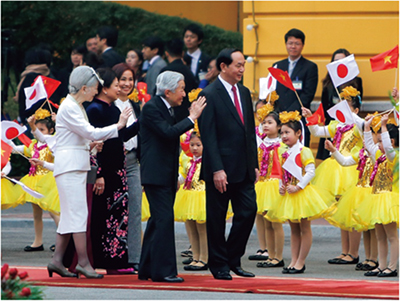 Their Majesties the Emperor and Empress attending a welcoming ceremony at the Presidential Palace (March 1, Hanoi, Viet Nam, Photo: Vietnam News Agency)
Their Majesties the Emperor and Empress attending a welcoming ceremony at the Presidential Palace (March 1, Hanoi, Viet Nam, Photo: Vietnam News Agency)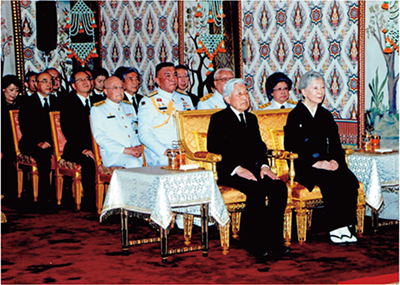 Their Majesties the Emperor and Empress conveying their condolences over the late King Bhumibol Adulyadej at the Grand Palace (March 5, Bangkok, Thailand, Photo: The Office of His Majesty's Private Principal Secretary, Kingdom of Thailand)
Their Majesties the Emperor and Empress conveying their condolences over the late King Bhumibol Adulyadej at the Grand Palace (March 5, Bangkok, Thailand, Photo: The Office of His Majesty's Private Principal Secretary, Kingdom of Thailand)At a welcome ceremony and banquet held at the Presidential Palace, Their Majesties received a magnificent welcome from President Quang and his spouse. Central Committee of the Communist Party General Secretary Trong and his spouse, Prime Minister Phuc and his spouse, and National Assembly Chairwoman Ngan were received in audience by Their Majesties. Their Majesties also spoke with Japanese nationals living in Viet Nam, such as Japan Overseas Cooperation Volunteers who are active locally, and former exchange students to Japan, as well as met with the families of former Japanese soldiers in Viet Nam. Furthermore, Their Majesties visited a museum where a goby specimen that was presented to the country by His Majesty in 1976 is on display.
In the ancient capital city of Hue, Their Majesties appreciated Viet Nam's Nha Nhac court music, which shares a common source with gagaku ancient Japanese court music, and visited the memorial hall of Phan Bôi Châu, the nationalist leader of the “Ðông-du Movement,” whose objective was to have young Vietnamese study in Japan at the beginning of the 20th Century. There, Their Majesties learned the history of exchange between the two countries.
During their visit, Their Majesties were warmly welcomed by the people of Vietnamese including many of those gathered along the roadside bearing the national flags of both countries in their hands.
On their way home from Viet Nam, Their Majesties also paid a visit to Thailand in order to convey their condolences to His Majesty King Bhumibol Adulyadej. A close relationship between Their Majesties, the late King and Her Majesty Queen Sirikit have been maintained exchanges for over half a century. The Imperial Family and the Thai Royal Family have a deep relationship – when the Thai Royal Family visits Japan they are frequently invited to the Imperial Palace, for example. The former King was always the symbol of the people of Thailand's respect and affection for a period of 70 years, and he also performed an extremely major role in promoting friendship and goodwill between Japan and Thailand. Their Majesties made a deep bow in front of the Grand Palace's altar in order to express their respect for the former King, and showed the depth of their sadness.
Their Majesties also met His Majesty King Maha Vajiralongkorn Bodindradebayavarangkun at Amphorn Sathan Residential Hall. This meeting between Their Majesties and the new King represents a new chapter in Japan-Thailand relations, and it is hoped that the amicable relations between the two countries will deepen further.
(9) Malaysia
In 2015, the Najib administration announced the “11th Malaysia Plan (a five-year plan from 2016 to 2020),” and with the aim of entering the group of advanced countries by 2020, the country has implemented deregulation and liberalization to strengthen international competitiveness, while maintaining steady growth at home, supported by investment and domestic consumption.
2017 marked the 60th anniversary of the establishment of Japan-Malaysia diplomatic relations, and a variety of commemorative events were held in both countries, deepening friendly ties between the people of the two countries. The leaders of both countries have also been communicating closely. A telephone Summit Meeting was held after the House of Representatives election in October, and a Summit Meeting on the occasion of the ASEAN-related Summit Meeting in Manila, the Philippines was also held in November. It was confirmed in the Summit Meeting that the two countries would further deepen the “Strategic Partnership.”
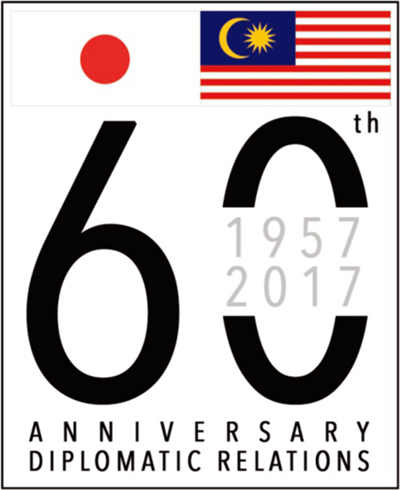 Official logo for the 60th Anniversary of the Establishment of Malaysia-Japan Diplomatic relations in 2017
Official logo for the 60th Anniversary of the Establishment of Malaysia-Japan Diplomatic relations in 2017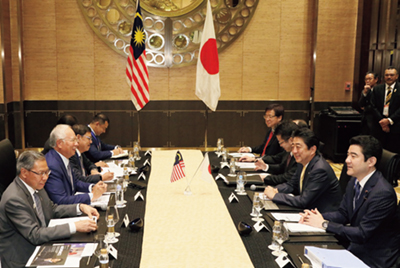 Japan-Malaysia Summit Meeting (November 12, Manila, the Philippines; Photo: Cabinet Public Relations Office)
Japan-Malaysia Summit Meeting (November 12, Manila, the Philippines; Photo: Cabinet Public Relations Office)The Look East Policy, which serves as a foundation for the good bilateral relationship between Japan and Malaysia, celebrated its 30th anniversary in 2012. In this program, about 16,000 people have studied or have been trained in Japan so far. Currently, the Look East Policy has been named “Look East Policy 2.0,” and efforts are being made to expand the fields covered and improve the quality of the initiative. The two countries are cooperating in making the Malaysia Japan International Institute of Technology (MJIIT), which was opened in September 2011, a base for Japanese-style engineering education in ASEAN countries.
On the economic front, Japan is the biggest investor to Malaysia, and 1,400 Japanese companies have been operating in Malaysia, demonstrating continued close cooperation between the two countries. The two countries have been studying the possibility of cooperation in a high-speed railway project between Malaysia and Singapore.
The year 2017 marked the 60th anniversary of diplomatic relations between Japan and Malaysia which was established in the same year as the independence of the Federation of Malaya in 1957. His Imperial Highness the Crown Prince's visit to Malaysia on this important milestone proved to be an excellent opportunity to showcase the friendly relations between Japan and Malaysia to people inside and outside Japan.
His Imperial Highness received a warm welcome from His Majesty The Yang di-Pertuan Agong XV Sultan Muhammad V, the Royal Families of Malaysia, government officials and the people of Malaysia. The meeting with His Royal Highness Sultan Dr. Nazrin Muizzuddin Shah, Deputy Yang di-Pertuan Agong of Malaysia, and luncheon hosted by The Honorable Dato'Sri Mohd Najib bin Tun Haji Abdul Razak, Prime Minister of Malaysia and his spouse left a strong impression of the continued and further developing relationship between the Imperial Family of Japan and the Royal Families of Malaysia as well as the advancements seen in the multilayered friendly relationship between the two countries.
Moreover, His Imperial Highness visited the University of Malaya, a cornerstone of the Government of Malaysia's Look East Policy initiated in 1982 (a human resources development program in which people of Malaysia learn the work ethic and will to learn/work from Japan and the Republic of Korea in order to develop Malaysia's economy and society and establish the country's industrial base). Through the programs of Look East Policy, approximately 16,000 Malaysian youth had been sent to Japan to study or train. In the remarks, His Imperial Highness noted that Japanese nationals studying in Malaysia can learn a great deal from Malaysia's society that respects diversity where multiple ethnicities, cultures and religions co-exist with one another.
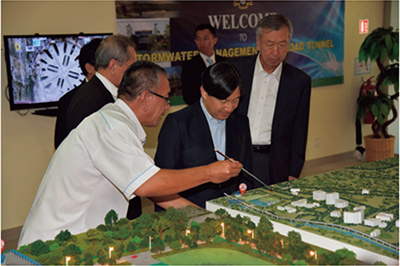 His Imperial Highness the Crown Prince listening to an explanation about the tunnel's mechanisms during a visit to the SMART Tunnel Control Center (April 15, Kuala Lumpur, Malaysia, Photo: Ministry of Communications and Multimedia Malaysia)
His Imperial Highness the Crown Prince listening to an explanation about the tunnel's mechanisms during a visit to the SMART Tunnel Control Center (April 15, Kuala Lumpur, Malaysia, Photo: Ministry of Communications and Multimedia Malaysia)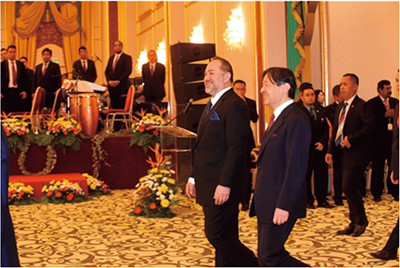 His Imperial Highness the Crown Prince attending a dinner reception with His Majesty The Yang di-Pertuan Agong XV Sultan Muhammad V (April 16, Kuala Lumpur, Malaysia, Photo: Ministry of Communications and Multimedia Malaysia)
His Imperial Highness the Crown Prince attending a dinner reception with His Majesty The Yang di-Pertuan Agong XV Sultan Muhammad V (April 16, Kuala Lumpur, Malaysia, Photo: Ministry of Communications and Multimedia Malaysia)On the final day of the visit, His Imperial Highness, who has long been studying water issue, visited the SMART Tunnel in Kuala Lumpur (a tunnel with the dual purpose of alleviating traffic congestion and preventing flooding) that His Imperial Highness introduced in his keynote address at the UN Special Thematic Session on Water and Disasters in 2016. During the visit, His Imperial Highness listened intently to the explanation on the tunnel's history, its mechanisms combining drainage function and transportation system to alleviate traffic congestion in the city, and its disaster risk reduction capabilities.
His Imperial Highness the Crown Prince's visit to Malaysia left a strong impression of the truly friendly relationship between Japan and Malaysia. The visit reminded both nations of the great efforts and hard work of forerunners from both countries over the years in building the friendly relationship between Japan and Malaysia today. It also got both nations to recognise the importance of people-to-people exchanges, particularly youth exchanges, in order to maintain and strengthen this friendly relationship. The visit proved to be deeply meaningful to both countries in the sense of entrusting the next 60 years of Japan-Malaysia relations to the next generation, based on friendship over the last 60 years.
(10) Myanmar
In March 2016 in Myanmar, a democratic administration was established for the first time in half a century with support by the majority of the people. Under the leadership of State Counsellor Aung San Suu Kyi, who had been leading a democratization movement for a long time, the country is making efforts for consolidation of democracy, national reconciliation, and economic development. Japan is providing full-fledged support to the Government of Myanmar's democratic nation building in collaboration between public and private sectors, based on recognition that stability of Myanmar, which has traditional friendship with Japan, geopolitical importance and huge potential for economic development, is directly related to stability and prosperity throughout the entire region. When State Counsellor Aung San Suu Kyi visited Japan in November 2016, Prime Minister Abe expressed his intention that Japan would contribute 800 billion yen over five years in total by public and private sectors. Since then, the Japanese Government has been accelerating efforts to cooperate in broad fields, including urban development, electricity and transportation infrastructure. In November 2017, at the meeting between Prime Minister Abe and State Counsellor Aung San Suu Kyi in Manila, the Philippines, Prime Minister Abe expressed his intention that Japan would implement development assistance programs which amount to 125 billion yen. Furthermore, in December, President Htin Kyaw visited Japan and a Japan-Myanmar Summit Meeting was held.
In Myanmar, achieving peace with ethnic armed groups, who have been fighting against the Government armed forces since Myanmar's independence, has been a pressing issue. In October 2015, eight ethnic armed groups, including Karen National Union (KNU), signed the Nationwide Ceasefire Agreement (NCA), and the remaining issue had been to reach an agreement with the remaining groups, including New Mon State Party (NMSP). Then in February 2018, NMSP and the Lahu Democratic Union (LDU) finally signed the NCA. The Government of Japan had supported the progress of peace negotiation through Special Envoy of the Government of Japan for National Reconciliation in Myanmar Yohei Sasakawa, who also signed the NCA as a witness during the signing ceremony. The Government of Japan has also been providing support for rebuilding livelihoods, by cooperating with Japanese NGOs, in the area under the control of the armed groups who have signed the NCA, such as in Kayin State, including construction of houses, schools, hospitals and bridges, so that the people residing in those areas can feel improvement in their living standards after the ceasefire.
In the western state of Rakhine, over 700,000 people were displaced to Bangladesh as a result of destabilization after the armed groups attacked security forces' bases in August. The international community expressed serious concern to the Government of Myanmar. Japan expressed serious concern over security and humanitarian and human rights situations in Rakhine State. Japan also expressed its intention to offer maximum support to the Government of Myanmar's efforts for providing humanitarian assistance, ensuring return of the displaced people, and peace and stability, encouraging Myanmar to ensure restoring security in accordance with the law and reopening humanitarian access.
(11) Laos
Laos is a land locked country bordering the five countries of China, Myanmar, Thailand, Cambodia, and Viet Nam and, therefore, is a key country in connecting the Mekong region. With regard to domestic affairs, being the year after the holding of the 10th Congress of the Lao People's Revolutionary Party and the 8th National Parliamentary Elections, there were no major changes under the single-party rule of the Lao People's Revolutionary Party. It was a year of stability for the Government. On the economic front, the Government strived to stabilize finances, which was the most pressing issue. On the other hand, economic growth remained steady at around 7%, which was about the same level as the previous year, driven by electricity and mineral resources. Japan and Laos formed a “Strategic Partnership” in 2015, and the countries have been deepening cooperative ties in extensive fields. Laos has been drawing the attention of Japanese companies in recent years for its investment potential, and in March Deputy Prime Minister Sonexay visited Japan, followed by Prime Minister Thongloun in June, who held investment seminars and economic forums. In the field of economic cooperation, steady progress was made in the Japan-Lao PDR Joint Development Cooperation Plan for the Sustainable Development of Lao PDR, which was announced by the Prime Ministers of both countries in September 2016. Particularly in regard to the strong request by the leaders of the Government of Laos for support in financial stability, Japan cooperated at multiple levels in the public and private sectors by dispatching experts, holding various seminars, etc. In June, a Japan-Lao PDR Summit Meeting and Foreign Ministers' Meeting were held. Parliamentary Vice-Minister for Foreign Affairs Odawara visited Laos in July, followed by Parliamentary Vice-Minister for Foreign Affairs Iwao Horii in September, representing momentum maintained in close and high-level exchanges between the two countries in recent years. Other than that, a memorandum of cooperation regarding Foreign Technical Intern Training Programs was signed in December between the Ministry of Justice, Ministry of Foreign Affairs, and Ministry of Health, Labour and Welfare of Japan, and the Ministry of Labour and Social Welfare of Lao PDR.
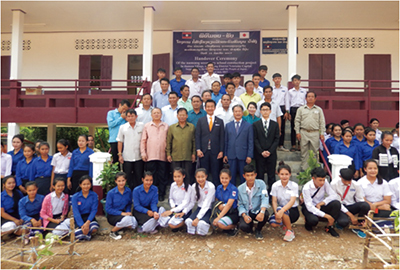 Parliamentary Vice-Minister for Foreign Affairs Odawara attends the ceremony to handover Namsang Secondary School built under the Grass-Roots Human Security Projects (July 13, Vientiane, Laos)
Parliamentary Vice-Minister for Foreign Affairs Odawara attends the ceremony to handover Namsang Secondary School built under the Grass-Roots Human Security Projects (July 13, Vientiane, Laos)

